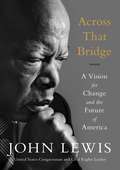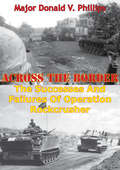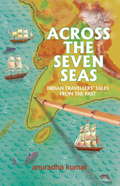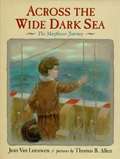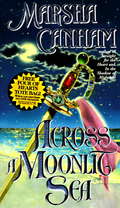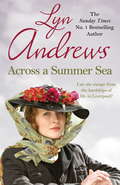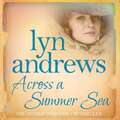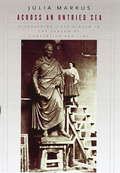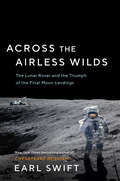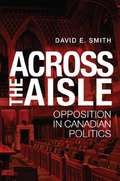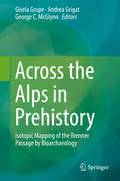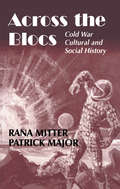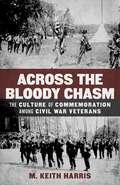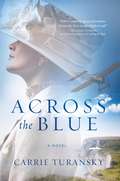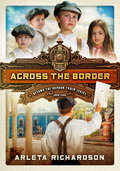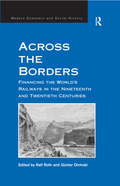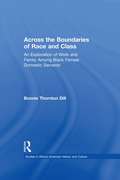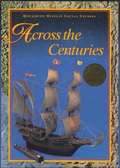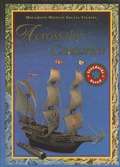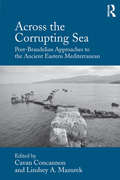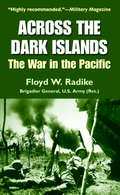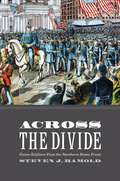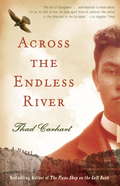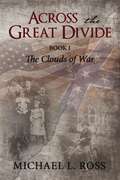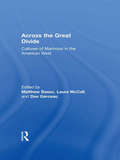- Table View
- List View
Across That Bridge: Life Lessons and a Vision for Change
by John LewisWinner of the NAACP Image Award for Outstanding Literary Work/Biography -- in paperback for the first time.In turbulent times Americans look to the Civil Rights Movement as the apotheosis of political expression. As we confront questions of social inequality there's no better time to revisit the lessons of the '60s and no better leader to learn from than Congressman John Lewis.In Across That Bridge, Congressman Lewis draws from his experience as a leader of the Civil Rights Movement to offer timeless guidance to anyone seeking to live virtuously and transform the world. His wisdom, poignant recollections, and powerful ideas will inspire a new generation to usher in a freer, more peaceful society. The Civil Rights Movement gave rise to the protest culture we know today, and the experiences of leaders like Congressman Lewis have never been more relevant. Now featuring an updated introduction from the author addressing the current administration, Across that Bridge offers a strong and moral voice to guide our nation through an era of great uncertainty."The most important lesson I have learned in the fifty years I have spent working toward the building of a better world is that the true work of social transformation starts within. It begins inside your own heart and mind, because the battleground of human transformation is really, more than any other thing, the struggle within the human consciousness to believe and accept what is true. Thus to truly revolutionize our society, we must first revolutionize ourselves. We must be the change we seek if we are to effectively demand transformation from others." ---John Lewis in Across That Bridge
Across The Border: The Successes And Failures Of Operation Rockcrusher
by Major Donald V. PhillipsThis study examines the planning, execution, and results of US military involvement in the 1970 Cambodian incursions. Named Operation Rockcrusher, the attacks targeted North Vietnamese sanctuaries in officially neutral Cambodia. Strategic guidance for the operation reflected the Nixon administration's desire to proceed with troop reductions and quickly "Vietnamize" the war in Southeast Asia. Efforts to set conditions for a U.S. withdrawal from Vietnam, including a covert bombing campaign of Cambodia, failed. These factors, along with a deteriorating political situation within Cambodia, led to approval of the assaults.The thesis describes the operational and tactical objectives that were derived from the strategic situation. Then, by discussing key portions of the campaign, the study examines how well the US Army accomplished these objectives. Reviewed within the context of selected battlefield operating systems, the operation reveals a decided "mixed bag" of success and failure.The study highlights lessons that may be appropriate to today's lower intensity conflict environment and force structures. It also promotes the need to synchronize goals and objectives throughout the levels of war. It concludes that attritional warfare, a dubious legacy from Vietnam, remains a danger to the Army today.
Across The Seven Seas: Indian Travellers' Tales
by Anuradha KumarA lot has been written about people who came to India at various times in history, but not enough about those who went from here to strange and surprising foreign lands. Way before trains and planes, speed and luxury, these intrepid globetrotters from India braved stormy seas and traversed hostile territories, documenting their travels and travails in detailed and often amusing accounts. Anuradha Kumar?s Across the Seven Seas brings together 14 dramatic accounts of Indian travellers from the 18th and 19th centuries, giving a vivid view of the world as it was then. These are stories of exploration and adventure, wonderment and acceptance. These are tales of great opportunities and tragic failures. These are chronicles of daring and discovery. You will marvel at the Mughal emperor?s emissary to the British king; the scientific genius who studied the power of steam; the army camp follower who became the master of `shampooing?; the legal eagle who was the first Indian woman to study law abroad; and the yogi who took the crowds by storm? These are the stories of travellers who traced pioneering routes to England, Italy, Turkey, Russia, America, China and more, all at a time of revolutionary technological advances, pervasive colonialism and amazing journeys...
Across The Wide Dark Sea: The Mayflower Journey
by Jean Van LeeuwenA boy and his family endure a difficult nine-week journey across the ocean and survive the first winter at Plymouth Plantation in Massachusetts.
Across a Moonlit Sea
by Marsha CanhamWhen Captain Spense and his lovely daughter Isabel rescued a man whose ship was floundering at sea, they took aboard the ruthless privateer Simon Dante. After seizing command of the ship, Simon set out to win another treasure, Isabel, a rare beauty with the expert navigational skills he needed to strike again on the high seas.
Across a Summer Sea: A warm-hearted, dramatic and nostalgic saga
by Lyn AndrewsFor the sake of her children, a young mother endures a violent marriage - but there is hope of better things to come... Lyn Andrews writes a moving saga in Across a Summer Sea, a tale of a mother's devotion and taking chances. Perfect for fans of Anne Baker, Katie Flynn and Cathy Sharp.Mary McGann's marriage has always been difficult, thanks to her husband Frank's drunken, jealous nature. Only because the little money he earns in the docks keeps food in the mouths of their children is Mary prepared to put up with him.When Frank throws them all out on the street, Mary flees to her family in Dublin. There she meets Richard O'Neill, a handsome though solitary man. Despite the attraction between them, Mary's not looking for love, and when she hears that Frank needs her, she returns to Liverpool, foreseeing a future of yet more hardship.But there are surprises in store. Though tragedy and danger are looming, a brighter horizon lies beyond - if Mary's prepared to be strong and take the chances that come her way... What readers are saying about Across a Summer Sea: '[Lyn Andrews] is most definitely my favourite author - I have never read anything which has been less than brilliant''What a truly enlightening story from heartbreak to untold hardships to finally find true love - beautiful''Five stars'
Across a Summer Sea: A warm-hearted, dramatic and nostalgic saga
by Lyn AndrewsMary McGann's marriage has always been difficult, thanks to her husband Frank's drunken, jealous nature. Only because the little money he earns in the docks keeps food in the mouths of their children is Mary prepared to put up with him. But when Frank throws them all out on the street, Mary flees to her family in Dublin. There she meets Richard O'Neill, a handsome though solitary man. Despite the attraction between them, Mary's not looking for love, and when she hears that Frank needs her, she returns to Liverpool, foreseeing a future of yet more hardship. But there are surprises in store. Though tragedy and danger are looming, a brighter horizon lies beyond - if Mary's prepared to be strong and take the chances that come her way.(P)2012 Headline Digital
Across an Untried Sea: Discovering Lives Hidden in the Shadow of Convention and Time
by Julia MarkusFrom the much acclaimed author of Dared and Done: The Marriage of Elizabeth Barrett and Robert Browning, a new book that retrieves the lives of Victorian women--writers, actresses, poets, journalists, sculptors, and social reformers--celebrated in their day but forgotten in ours. Julia Markus focuses in particular on the American Charlotte Cushman, the most famous English-speaking actress of her day, and on the Scottish Jane Welsh Carlyle, a brilliant London hostess who gave up private ambition to become the wife of her friend Thomas Carlyle.Charlotte Cushman became an international star on the New York and London stage, and her Romeo and Hamlet were sensations. An independent woman with shrewd business sense who made her own fortune and supported her entire family, she dressed like a man from the waist up and had a succession of female lovers, each one of whom she planned to live with for life, each of whom she 'married.'Jane Welsh Carlyle, literary hostess, unparalleled letter writer and chronicler of her times--who, after a passionate youthful love affair, resolved to marry genius or not at all--became the wife of the revered and lionized philosopher Thomas Carlyle, a difficult, demanding man with whom she had a sexless marriage.Interweaving the worlds of Charlotte Cushman and Jane Carlyle--the worlds of expatriate Rome, literary London, New York, and St. Louis--Markus gathers together a number of interrelated and renowned women who were relegated in the public eye to the position of Virgin Queen (no matter how much married) or Old Maid, but who were, in fact, privately leading vibrant, independent, sexual lives. Among them: Matilda Hays, translator of George Sand; Harriet Hosmer, who resolved to become the world's first professional woman sculptor; and Emma Stebbins, whom Cushman 'married' and who created the Bethesda Fountain in New York's Central Park. Here, too, are the people who sought the friendship of Cushman and Carlyle, including Ralph Waldo Emerson, Horace Mann, Elizabeth Peabody, President Lincoln's Secretary of State William H. Seward, Geraldine Jewsbury, and Rosa Bonheur.Making use of letters, diaries, newspaper accounts, and journals of the day, many of them overlooked and unpublished, Julia Markus rediscovers lives forgotten in the shadows of convention and shows how these remarkable women--seemingly separated by nationality, class, and sexual inclination--met, formed alliances, and influenced one another, forging changes in themselves and in their time.
Across the Airless Wilds: The Lunar Rover and the Triumph of the Final Moon Landings
by Earl Swift"THRILLING. ... Up-end[s] the Apollo narrative entirely." —The Times (London)A "brilliantly observed" (Newsweek) and "endlessly fascinating" (WSJ) rediscovery of the final Apollo moon landings, revealing why these extraordinary yet overshadowed missions—distinguished by the use of the revolutionary lunar roving vehicle—deserve to be celebrated as the pinnacle of human adventure and exploration.One of The Wall Street Journal's 10 Best Books of the Month8:36 P.M. EST, December 12, 1972: Apollo 17 astronauts Gene Cernan and Jack Schmitt braked to a stop alongside Nansen Crater, keenly aware that they were far, far from home. They had flown nearly a quarter-million miles to the man in the moon’s left eye, landed at its edge, and then driven five miles in to this desolate, boulder-strewn landscape. As they gathered samples, they strode at the outermost edge of mankind’s travels. This place, this moment, marked the extreme of exploration for a species born to wander. A few feet away sat the machine that made the achievement possible: an electric go-cart that folded like a business letter, weighed less than eighty pounds in the moon’s reduced gravity, and muscled its way up mountains, around craters, and over undulating plains on America’s last three ventures to the lunar surface. In the decades since, the exploits of the astronauts on those final expeditions have dimmed in the shadow cast by the first moon landing. But Apollo 11 was but a prelude to what came later: while Neil Armstrong and Buzz Aldrin trod a sliver of flat lunar desert smaller than a football field, Apollos 15, 16, and 17 each commanded a mountainous area the size of Manhattan. All told, their crews traveled fifty-six miles, and brought deep science and a far more swashbuckling style of exploration to the moon. And they triumphed for one very American reason: they drove.In this fast-moving history of the rover and the adventures it ignited, Earl Swift puts the reader alongside the men who dreamed of driving on the moon and designed and built the vehicle, troubleshot its flaws, and drove it on the moon’s surface. Finally shining a deserved spotlight on these overlooked characters and the missions they created, Across the Airless Wilds is a celebration of human genius, perseverance, and daring.
Across the Aisle
by David E. SmithHow do parties with official opposition status influence Canadian politics? Across the Aisle is an innovative examination of the theory and practice of opposition in Canada, both in Parliament and in provincial legislatures. Extending from the pre-Confederation era to the present day, it focuses on whether Canada has developed a coherent tradition of parliamentary opposition.David E. Smith argues that Canada has in fact failed to develop such a tradition. He investigates several possible reasons for this failure, including the long dominance of the Liberal party, which arrested the tradition of viewing the opposition as an alternative government; periods of minority government induced by the proliferation of parties; the role of the news media, which have largely displaced Parliament as a forum for commentary on government policy; and, finally, the increasing popularity of calls for direct action in politics.Readers of Across the Aisle will gain a renewed understanding of official opposition that goes beyond Stornoway and shadow cabinets, illuminating both the historical evolution and recent developments of opposition politics in Canada.
Across the Alps in Prehistory: Isotopic Mapping of the Brenner Passage by Bioarchaeology
by Gisela Grupe George C. Mcglynn Andrea GrigatAt the heart of this book is the matter of how isotopic landscapes combined with data mining enriches insights on prehistoric migration and cultural transfer. Isotopic mapping is an indispensable tool for the assessment of mobility and trade in the past, but is limited by eco-geographic redundancies. An interdisciplinary research group focuses on the archaeological isotopic landscape of a reference region of outstanding importance, namely the transalpine migration route via the Brenner Pass which has been in use since the Mesolithic. Over the period of several cultural epochs, cremation was either the most common or exclusive burial custom practiced. For the first time, a systematic and large scale investigation of cremated remains was being conducted in the field of prehistoric migration research. 87Sr/86Sr, 208Pb/204Pb, 207Pb/204Pb, 206Pb/204Pb, 208Pb/207Pb, 206Pb/207Pb and - if applicable - also δ18O were measured in human and animal skeletal finds, an isotopic map was established, and innovative methods of data mining and similarity research have been applied to accomplish this novel approach to studying prehistoric migration and culture transfer. The book has interdisciplinary appeal and scholars working in bioarchaeology, physical anthropology and computer applications in life sciences will find it of particular interest.
Across the Blocs: Exploring Comparative Cold War Cultural and Social History (Cold War History)
by Rana Mitter Patrick MajorThis book asks the reader to reassess the Cold War not just as superpower conflict and high diplomacy, but as social and cultural history. It makes cross-cultural comparisons of the socio cultural aspects of the Cold War across the East/West block divide, dealing with issues including broadcasting, public opinion, and the production and consumption of popular culture.
Across the Bloody Chasm: The Culture of Commemoration among Civil War Veterans (Conflicting Worlds: New Dimensions of the American Civil War)
by M. Keith HarrisLong after the Civil War ended, one conflict raged on: the battle to define and shape the war's legacy. Across the Bloody Chasm deftly examines Civil War veterans' commemorative efforts and the concomitant -- and sometimes conflicting -- movement for reconciliation. Though former soldiers from both sides of the war celebrated the history and values of the newly reunited America, a deep divide remained between people in the North and South as to how the country's past should be remembered and the nation's ideals honored. Union soldiers could not forget that their southern counterparts had taken up arms against them, while Confederates maintained that the principles of states' rights and freedom from tyranny aligned with the beliefs and intentions of the founding fathers. Confederate soldiers also challenged northern claims of a moral victory, insisting that slavery had not been the cause of the war, and ferociously resisting the imposition of postwar racial policies. M. Keith Har-ris argues that although veterans remained committed to reconciliation, the sectional sensibilities that influenced the memory of the war left the North and South far from a meaningful accord. Harris's masterful analysis of veteran memory assesses the ideological commitments of a generation of former soldiers, weaving their stories into the larger narrative of the process of national reunification. Through regimental histories, speeches at veterans' gatherings, monument dedications, and war narratives, Harris uncovers how veterans from both sides kept the deadliest war in American history alive in memory at a time when the nation seemed determined to move beyond conflict.
Across the Blue: A Novel
by Carrie TuranskySet in Edwardian England and ideal for readers who enjoy Julie Klassen novels, this romance about an English aviation pioneer and the girl who falls in love with him is filled with adventure and faith.Isabella Grayson, the eldest daughter of a wealthy, English newspaper magnate, longs to become a journalist, but her parents don't approve. They want her to marry well and help them gain a higher standing in society. After she writes an anonymous letter to the editor that impresses her father, her parents reluctantly agree she can write a series of articles about aviation and the race to fly across the English Channel, but only if she promises to accept a marriage proposal within the year. When James Drake, an aspiring aviator, crashes his flying machine at the Grayson's new estate, Bella is intrigued. James is determined to be the first to fly across the Channel and win the prize Mr. Grayson's newspaper is offering. He hopes it will help him secure a government contract to build airplanes and redeem a terrible family secret. James wants to win Bella's heart, but his background and lack of social standing make it unlikely her parents would approve. If he fails to achieve his dream, how will he win the love and respect he is seeking? Will Bella's faith and support help him find the strength and courage he needs when unexpected events turn their world upside down?
Across the Border
by Arleta RichardsonLife on the Rush farm in South Dakota is not easy. Even so, over the past four years, Ethan Cooper and his siblings have grown to feel they belong with their adoptive family. Then Chad Rush makes an unexpected announcement. The family is moving again--this time to Mexico! Ethan is scared. What dangers will they face in another country? What will it be like to live on an oil homestead instead of a farm? And what about his dreams of getting an education? He can't leave his siblings after he's promised they would stay together--can he? Based on a true story, this conclusion to the Beyond the Orphan Train series reminds us that the same God who is with us from the start never lets us go.
Across the Borders: Financing the World's Railways in the Nineteenth and Twentieth Centuries (Modern Economic and Social History)
by Günter DinhoblUntil now we have only had relatively narrow economic studies comparing investments in railways with investments in other fields of individual economies. 'Across the Borders' not only opens the door for fundamental new insights into a trans-national view of railway history, but also contributes to a breakthrough in the wider study of the subject, providing the first extensive historical investigation of the worldwide system of railway financing. This book provides a wide introduction to how financiers, governments and entrepreneurs in Europe managed to face the challenges of constructing and maintaining an integrated railway network, both in their own countries and their colonies. This volume offers analysis from a selection of experts exploring the trans-national investment policies of railway construction based on numerous historical case-studies. The chapters provide insight into the international opportunities that existed for railway financing, from the perspective of economic, social, transport and railway history. With contributions from authors from 19 countries the volume is a truly international work that will be of interest to academic researchers, museum staff, archivists, and anyone who has an interest in the history and development of railways.
Across the Boundaries of Race & Class: An Exploration of Work & Family among Black Female Domestic Servants (Studies in African American History and Culture)
by Bonnie T. DillFirst published in 1994. Almost fifteen years after this study was written, many social changes have occurred affecting domestic service; yet some things remain the same. Among the changes are the increased labor force participation rates of women and the resultant rise in the demand for private household help. This volume is part of the Studies on African American History and Culture series, looking at the role, occupation, impact of race and employee relationships of black domestic servants. It also includes three case studies, stories of resistant and families and children. Across the Boundaries of Race and Class was one of the earliest attempts to examine the ways the structure and organization of housework as women’s work influenced the work and family lives of domestic workers. As pointed out in the book, the women who were the subjects of this study exemplified a pattern of domestic work that was fading even as it was being studied: most worked for one family for twenty to thirty years.
Across the Centuries
by Franklin Ng Gary B. Nash J. Jorge Klor de Alva Jacqueline M. CordovaAs you get to know the people of the past, you'll want ways of understanding and remembering them better. This book gives you some tools to use in learning about people and places and remembering what you've learned. What makes this textbook so much more interesting than others you've used? In this book, the people of the past speak directly to you, through their actual words and the objects they used. You'll walk inside their houses and look inside their cooking pots. You'll follow them as they go to school, build cities, fight wars, work out settlements for peace.
Across the Corrupting Sea: Post-Braudelian Approaches to the Ancient Eastern Mediterranean
by Cavan Concannon Lindsey A. MazurekAcross the Corrupting Sea: Post-Braudelian Approaches to the Ancient Eastern Mediterranean reframes current discussions of the Mediterranean world by rereading the past with new methodological approaches. The work asks readers to consider how future studies might write histories of the Mediterranean, moving from the larger pan-Mediterranean approaches of The Corrupting Sea towards locally-oriented case studies. Spanning from the Archaic period to the early Middle Ages, contributors engage the pioneering studies of the Mediterranean by Fernand Braudel through the use of critical theory, GIS network analysis, and postcolonial cultural inquiries. Scholars from several time periods and disciplines rethink the Mediterranean as a geographic and cultural space shaped by human connectivity and follow the flow of ideas, ships, trade goods and pilgrims along the roads and seascapes that connected the Mediterranean across time and space. The volume thus interrogates key concepts like cabotage, seascapes, deep time, social networks, and connectivity in the light of contemporary archaeological and theoretical advances in order to create new ways of writing more diverse histories of the ancient world that bring together local contexts, literary materials, and archaeological analysis.
Across the Dark Islands: At War in the Pacific
by Floyd W. RadikeFloyd W. Radike Brigadier General, U.S. Army (Ret.) "I remember sitting in a foxhole on Guadalcanal in the rain. The sergeant I shared the hole with shook his head and asked me: 'What in the hell are we doing on this godforsaken island? Why don't we let the Japs keep this stinking rock?' I didn't have an answer." The war in the Pacific has never been portrayed more honestly--or in prose more powerful--than in Across the Dark Islands. In this unflinching account, Brig. Gen. Floyd W. Radike remembers how he started his military career in the mud and mayhem of Guadalcanal, fighting a campaign as crucial to the war's outcome as it was chaotic and cruel. Here is no whitewashed view of that war or the men who waged it. Here instead is the sobering story of a junior officer in a National Guard unit suddenly shipped off to the front lines, disdained by "regular army" elitists who served beside him, and given second-class status so that others could earn headlines and promotions. While struggling to survive amid dirt and disease, routine and monotony, Radike endured harrowing missions incompetently, arrogantly, or just impatiently planned. As no book ever has, Across the Dark Islands reveals shocking details removed from myth and sentimentality: how American commanders were intimidated by the Japanese stereotype of fearlessness, night attacks, and cries of "banzai" ... how imitations of John Wayne heroics caused immediate death ... threats of court-martial quieted accusations of Army injustice ... and panic and flight destroyed a fight for the enemy's Munda Field airstrip, an event that "disappeared from the record and appears in no official history." Emerging from the hellish conditions and military miscalculations is a tribute to common sense, courage, and respect for proper procedure, attributes that would help the author and soldiers like him to save their lives, succeed in battle, and win the war. From Guadalcanal to the Philippines to a planned invasion of Japan ended by the atom bomb, General Radike's experience spanned the entire course of the pivotal Pacific theater conflict. Candid and cautionary, his memoir is an important work whose writing rivals that of classic novels like James Jones's The Thin Red Line and Norman Mailer's The Naked and the Dead. It should be read by anyone looking to join an army or wage a war.
Across the Divide: Union Soldiers View the Northern Home Front
by Steven J. RamoldUnionsoldiers left home in 1861 with expectations that the conflict would be short,the purpose of the war was clear, and public support back home was universal.As the war continued, however, Union soldiers began to perceive a greatdifference between what they expected and what was actually occurring. Theirfamily relationships were evolving, the purpose of the war was changing, andcivilians were questioning the leadership of the government and Army to thepoint of debating whether the war should continue at all.Separatedfrom Northern civilians by a series of literal and figurative divides, Unionsoldiers viewed the growing disparities between their own expectations andthose of their families at home with growing concern and alarm. Instead ofsupport for the war, an extensive and oft-violent anti-war movement emerged.Often at odds with those at home and with limited means of communication totheir homes at their disposal, soldiers used letters, newspaper editorials, andpolitical statements to influence the actions and beliefs of their homecommunities. When communication failed, soldiers sometimes took extremistpositions on the war, its conduct, and how civilian attitudes about theconflict should be shaped.In thisfirst study of the chasm between Union soldiers and northern civilians, Steven J.Ramold reveals the wide array of factors that prevented the Union Army and thecivilians on whose behalf they were fighting from becoming a united frontduring the Civil War. In Across theDivide, Ramold illustrates how the divided spheres of Civil War experiencecreated social and political conflict far removed from the better-knownbattlefields of the war.
Across the Endless River: A Novel
by Thad CarhartBorn in 1805 on the Lewis and Clark expedition, Jean-Baptiste Charbonneau is the son of Sacagawea and Toussaint Charbonneau. He is raised both as William Clark’s ward in St. Louis and by his parents among the villages of the Mandan tribe on the far northern reaches of the Missouri river. In 1823 eighteen-year-old Baptiste is invited to cross the Atlantic with the young Duke Paul of Württemberg, whom he meets on the frontier. During their travels throughout Europe, Paul introduces Baptiste to a world he never imagined, and Baptiste ultimately faces a choice: whether to stay in Europe or return to the wilds of North America. As we follow this young man on his intriguing sojourn, this remarkable novel resonates with the richness of three distinct cultures, languages, and customs.
Across the Great Divide: Book 1 The Clouds of War (Across The Great Divide Ser. #Vol. 2)
by Michael RossLexington, Kentucky, 1859. After saving John Hunt Morgan from a puma attack, fifteen-year-old farm boy Will Crump joins Hunt’s militia, the Lexington Rifles. Morgan mentors Will and enrolls him in the local university, where he hopes to study law. As tensions rise between the North and South, Will is torn between his loyalty to Morgan and his love for his family. Will’s father, sisters, and sweetheart follow the Union, while Morgan and Will commit to the South. As part of Morgan’s band, Will participates in ambushes and unconventional warfare until his first real battle at Shiloh. He fights bravely, but increasingly questions what the war is accomplishing, and whether his devotion to honor has led him astray. And where is God in all this killing?Will’s sister Albinia, friend of the Clay family, becomes increasingly aware of the plight of the slaves. When she finds Luther, a slave she knows, trying to escape, she must decide between her conscience, and her friends. She becomes involved in the Underground Railroad, helping slaves to freedom – but will it cost her love and her freedom?Will’s other sister, Julia, is approaching spinster status and despairs of ever meeting a man who can give her more than life on a farm until she meets Hiram Johannsen, a son of immigrants who owns a steamship company. They marry and she makes a new life in the North. When Hiram answers the call to fight for the North, Julia runs the steamboat company in her husband’s absence and uses her boats to help Albinia ferry escaped slaves to freedom. Her business relations put her in the perfect position to spy for the North. When the Confederates capture her, will she survive?Luther is one of the first slaves Albinia helps flee the South after his master cruelly abuses his mother and sister. He escapes with his family, and when war breaks out, he fights for the North as an auxiliary of the Third Ohio Cavalry, alongside Julia’s husband, Hiram, and against Morgan and Will. Luther has to confront the demons of his past, an abusive master, and a slave catcher that kills his little sister. Will the desire for revenge destroy him?Throughout the war, Will is forced to examine and question everything he believes in—his faith in God, his love for his family, his loyalty to Morgan, and his worth as a human being.Will and his family must somehow mend the torn fabric of relationships to find peace, and reach Across the Great Divide.
Across the Great Divide: Cultures of Manhood in the American West
by Matthew Basso Laura McCall Dee GarceauIn Across the Great Divide, some of our leading historians look to both the history of masculinity in the West and to the ways that this experience has been represented in movies, popular music, dimestore novels, and folklore.
